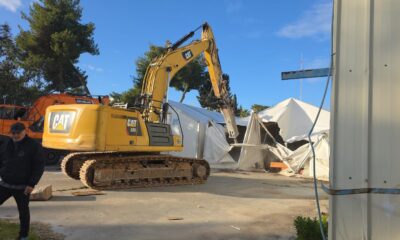International
Israel says 100 Hezbollah rocket launchers hit in Lebanon
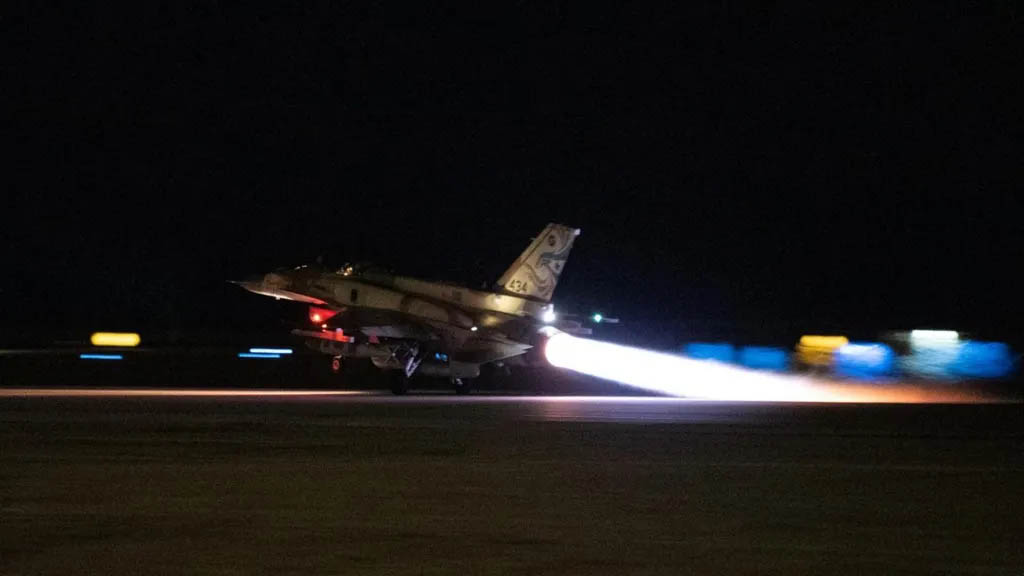
Israel says 100 Hezbollah rocket launchers hit in Lebanon
Israel has carried out extensive air strikes on southern Lebanon, saying its warplanes have hit more than 100 Hezbollah rocket launchers and other “terrorist sites” including a weapons storage facility.
The Israel Defense Forces (IDF) said the launchers were ready to be fired against Israel. It was not immediately clear if there were any casualties.
Lebanon’s state-run National News Agency said Israel carried out at least 52 strikes in the south of the country on Thursday evening, and that Lebanon had also launched strikes on military sites in northern Israel.
Earlier, Hezbollah leader Hassan Nasrallah said deadly explosions earlier in the week “crossed all red lines”, accusing Israel of what he said represented a declaration of war.
Israel has not said it was behind the attacks – which saw pagers and walkie-talkies explode simultaneously across the country – on Tuesday and Wednesday, and which Lebanese authorities said killed 37 people and wounded 3,000.
But Defence Minister Yoav Gallant has said Israel is embarking on a “new phase of the war”, concentrating more of its efforts on the north.
The previously sporadic cross-border fighting escalated on 8 October 2023 – the day after the unprecedented attack on Israel by Hamas gunmen from Gaza – when Hezbollah fired at Israeli positions, in solidarity with the Palestinians.
Since then hundreds of people, most of them Hezbollah fighters, have been killed in the cross-border fighting, and tens of thousands have also been displaced on both sides of the border.
Hezbollah has said it is acting in support of the Palestinian armed group Hamas. Both are backed by Iran and proscribed as terrorist organisations by Israel, the UK and other countries.
READ ALSO:
- Gaza ceasefire deal unlikely in Biden’s term, WSJ reports
- Israeli planes bomb southern Lebanon after radio blasts
- Edo polls and the famous product vendor, by Azu Ishiekwene
In a statement late on Thursday, the IDF said its warplanes “struck approximately 100 launchers and additional terrorist infrastructure sites, consisting of approximately 1,000 barrels that were ready to be used in the immediate future to fire toward Israeli territory”.
“The IDF will continue to operate to degrade the Hezbollah terrorist organisation’s infrastructure and capabilities in order to defend the state of Israel”.
Lebanese security sources cited by Reuters news agency and the New York Times said the Israeli strikes were one of the most intense since the war in Gaza began in October last year.
The IDF also urged residents in northern Israel close to the Lebanese border to avoid large gatherings, guard their neighbourhoods and stay close to bomb shelters.
On Thursday morning, Hezbollah fighters in southern Lebanon fired two anti-tank missiles across the border, followed by drones.
The IDF said two Israeli soldiers were killed and a third seriously wounded.
In his televised address on Thursday, Hassan Nasrallah said of Tuesday and Wednesday’s attacks: “The enemy crossed all rules, laws and red lines. It didn’t care about anything at all, not morally, not humanely, not legally.”
“This is massacre, a major aggression against Lebanon, its people, its resistance, its sovereignty, and its security. It can be called war crimes or a declaration of war – whatever you choose to name it, it is deserving and fits the description. This was the enemy’s intention,” he added.
As Nasrallah spoke, Israeli warplanes caused sonic booms over Beirut, scaring an already-exhausted population, and others struck targets in southern Lebanon.
The Hezbollah leader acknowledged that this was a massive and unprecedented blow for his group, but he insisted that its ability to command and communicate remained intact.
Nasrallah’s tone was defiant and he vowed a harsh punishment. But, again, he indicated that Hezbollah was not interested in an escalation of its current conflict with Israel.
READ ALSO:
- NCC moves to boost internet speed with 6GHz spectrum
- Pension bill: Police retirees to embark on protest
- Actress Adunni Ade speaks on cab driver lawsuit threat
The group’s cross-border attacks, he said, were going to continue unless there was a ceasefire in Gaza, and that no killings or assassinations would return residents to northern Israel.
The IDF said on Thursday that its chief of staff, Lt Gen Herzi Halevi, had “recently completed approval of plans for the northern arena”.
Gallant later said that “in the new phase of the war there are significant opportunities but also significant risks”.
“Hezbollah feels that it is being persecuted and the sequence of military actions will continue,” he added.
“Our goal is to ensure the safe return of Israel’s northern communities to their homes. As time goes by, Hezbollah will pay an increasing price.”
It is not clear how Israel intends to achieve this goal. But reports earlier this week suggested that the general in charge of the IDF’s Northern Command favoured the creation of an Israeli-controlled buffer zone inside southern Lebanon.
US Secretary of State Antony Blinken called for restraint on all sides.
“We don’t want to see any escalatory actions by any party” that would make the goal of achieving a ceasefire in Gaza more difficult, he said as he joined European foreign ministers in Paris to discuss the widening crisis.
UK Foreign Secretary David Lammy, who was also at the talks in Paris, called for an immediate ceasefire between Israel and Hezbollah.
“We are all very, very clear that we want to see a negotiated political settlement so that Israelis can return to their homes in northern Israel and indeed Lebanese to return to their homes,” he said.
Israel says 100 Hezbollah rocket launchers hit in Lebanon
BBC
International
Israeli Airstrikes Kill 12 in Gaza as Violence Persists Despite Ceasefire
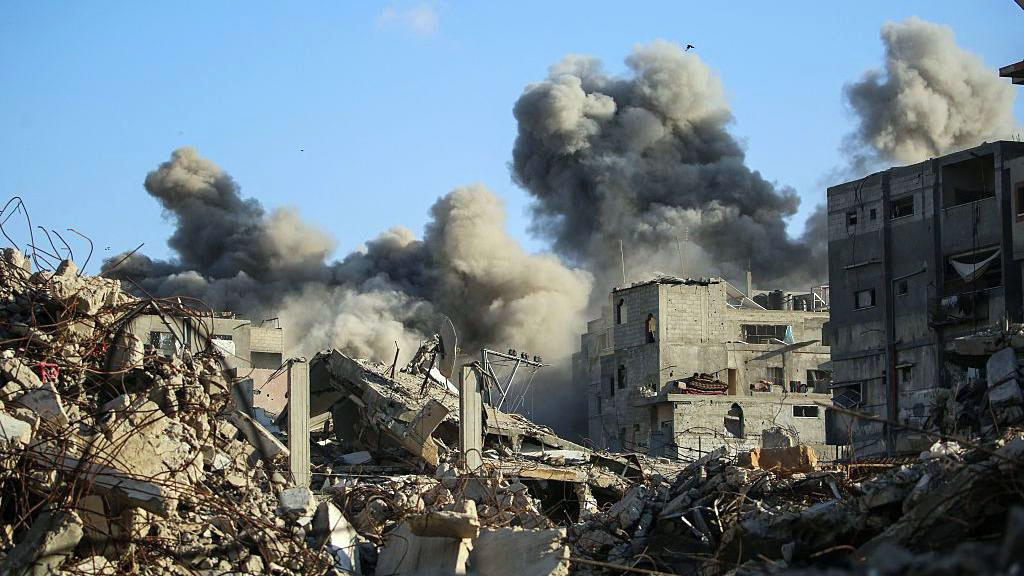
Israeli Airstrikes Kill 12 in Gaza as Violence Persists Despite Ceasefire
At least 12 Palestinians have been killed in Israeli airstrikes across the Gaza Strip, the territory’s civil defence agency reported on Sunday, marking one of the deadliest days since a fragile ceasefire was implemented. The strikes hit multiple areas, including Jabalia refugee camp in northern Gaza and the southern city of Khan Younis, leaving several others injured.
The Gaza Civil Defence, responsible for rescue and emergency operations under Hamas, said one airstrike struck a tent sheltering displaced civilians in Jabalia, killing at least five people and wounding others. Another strike in Khan Younis also claimed five lives, while additional shelling in Beit Lahia and western Gaza City caused further casualties. Local authorities said most victims were civilians, including families displaced by previous attacks.
READ ALSO:
- FBI Probe Continues as Ex‑Church Minister Who Confessed to Child Abuse Remains Free
- Presidency Dismisses El-Rufai’s Thallium Claim as Diversion From N432bn Probe
- Ghana Moves to Extradite Russian Man Over Secret Sex Video Scandal
The Israel Defence Forces (IDF) said its operations targeted armed militants and underground infrastructure allegedly used to launch attacks, describing the strikes as a response to ceasefire violations. Palestinian authorities condemned the strikes as a massacre and a breach of the truce, while international observers expressed concern over the continuing civilian casualties.
Since the U.S.-brokered ceasefire in October 2023, tensions in Gaza have remained high, with sporadic clashes and violations on both sides. Gaza health authorities report that over 600 Palestinians have been killed and more than 1,600 injured by Israeli strikes since the truce took effect. Humanitarian organisations warn that repeated airstrikes have devastated infrastructure, leaving displaced families vulnerable and worsening living conditions.
International observers note that the ongoing violence threatens reconstruction efforts and regional stability. With limited access for media and aid agencies, verifying casualty figures remains difficult, though reports consistently highlight the severe impact on civilians and displaced families.
The Gaza civil defence called on residents to stay vigilant, avoid military targets, and seek safety as authorities continue to respond to emergency situations across the territory. The situation underscores the fragility of the ceasefire and the urgent need for renewed diplomatic efforts to prevent further civilian casualties.
Israeli Airstrikes Kill 12 in Gaza as Violence Persists Despite Ceasefire
International
FBI Probe Continues as Ex‑Church Minister Who Confessed to Child Abuse Remains Free
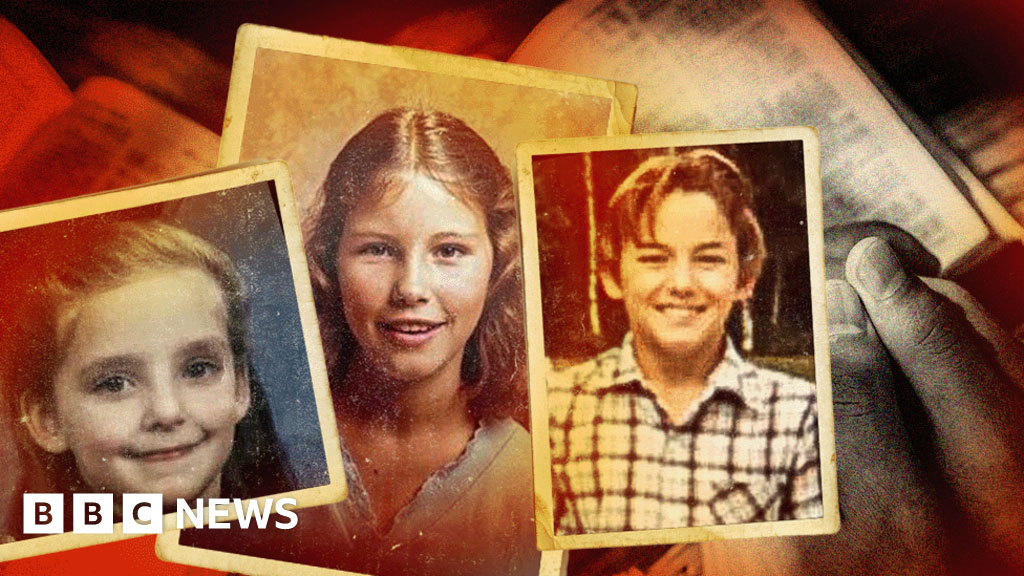
FBI Probe Continues as Ex‑Church Minister Who Confessed to Child Abuse Remains Free
An ex‑minister of a secretive Christian group who publicly admitted to child sexual abuse during a BBC interview remains free more than two years later, despite ongoing investigations by the Federal Bureau of Investigation (FBI) and renewed allegations from other victims. The man, Robert Corfield, once served as a minister in a shadowy church commonly known as The Truth or the Two by Twos — a global network of itinerant ministers with no official headquarters or widely recognised name. In early 2024, Corfield told the BBC that he had sexually abused a boy named Michael Havet for six years starting in the 1980s when Havet was 12 years old, in Saskatchewan, Canada.
Corfield’s admission was part of a larger wave of revelations about abuse in the Two by Twos community. His name was among more than 1,100 reported to a hotline set up to document cases of sexual abuse within the church. About a month after the BBC’s initial investigation, the FBI launched a probe into allegations of child sexual abuse within the group. Although Corfield spoke to FBI agents in late 2024 or early 2025, saying he “responded with the truth,” he has not been contacted by authorities since that visit and remains at liberty in the U.S. state of Montana. When asked if he fears arrest, Corfield acknowledged that “there is that possibility.”
READ ALSO:
- Presidency Dismisses El-Rufai’s Thallium Claim as Diversion From N432bn Probe
- Ghana Moves to Extradite Russian Man Over Secret Sex Video Scandal
- Residents Flee as Gunmen Launch Fresh Attack on Kwara Community
Authorities, including the Royal Canadian Mounted Police (RCMP), have also been involved. The RCMP confirmed it investigated historic sexual assaults that occurred in the 1980s and sent files to Crown prosecutors for assessment, while the Saskatchewan Ministry of Justice noted it does not comment on cases currently under investigation. A separate alleged victim, identified only as Edward, came forward in 2025 claiming he was sexually assaulted by Corfield in 1974 at age 11, well before Corfield’s abuse of Michael. Edward also described alleged grooming behaviours, adding to concerns about Corfield’s past conduct.
Corfield’s case is part of broader allegations of abuse in the Two by Twos community, which some survivors and investigators describe as insular and resistant to external scrutiny. Advocacy groups have reported hundreds of alleged historical abusers connected to the sect globally. In the United States, a former elder of the Two by Twos was sentenced to 120 years in prison for possessing child sexual abuse material, highlighting that criminal accountability is possible when prosecutions occur. Survivors and advocates have criticised the church leadership’s historical handling of abuse allegations, alleging that serious complaints were ignored or covered up. Former members say the group’s structure — with ministers often hosted in private homes and an emphasis on internal solutions — made it easier for abuse to go unreported for decades.
While investigators continue their work, Corfield’s freedom has drawn sharp criticism from survivors like Michael, who has expressed confusion and frustration at the slow pace of legal action. Advocates have urged authorities in both the United States and Canada to urgently pursue all leads, not only against individual perpetrators but also over potential institutional failures within the church. Support networks for survivors have also grown online and through advocacy organisations, offering counselling and community resources for victims of the alleged abuse. Despite these efforts, many survivors say justice remains elusive more than two years after the minister’s public confession.
FBI Probe Continues as Ex‑Church Minister Who Confessed to Child Abuse Remains Free
International
Trump Halts Minnesota Immigration Crackdown After Fatal Shootings, Protests

Trump Halts Minnesota Immigration Crackdown After Fatal Shootings, Protests
The Trump administration has officially halted Operation Metro Surge, a controversial immigration enforcement operation in Minnesota, following widespread protests, political backlash, and the deaths of two U.S. citizens. The decision was announced by Tom Homan, the U.S. “border czar,” who confirmed that President Donald Trump approved ending the monthslong crackdown.
Operation Metro Surge, launched in December 2025, focused on the Minneapolis–St. Paul metropolitan area, deploying nearly 3,000 federal immigration officers at its peak. The operation aimed to detain undocumented immigrants, which the Department of Homeland Security (DHS) described as targeting “criminal illegal aliens.” However, reports indicate that many detainees had no criminal records, including children and U.S. citizens, raising concerns about the operation’s scope and fairness.
- Army University Professor Dies in Boko Haram Captivity After Nearly One Year
- MURIC Calls Proposed US Sanctions on Nigerian Muslims ‘Lopsided’
- Supreme Court Affirms Muslim Students’ Right to Worship at Rivers State University
The crackdown drew intense public opposition after anti-ICE protesters Renée Good and Alex Pretti were fatally shot during separate incidents in Minneapolis. The shootings intensified calls for accountability and prompted local and national criticism of federal enforcement tactics.
In a statement, Homan said, “I have proposed and President Trump has concurred that this surge operation conclude.” He noted that a drawdown of federal personnel had already begun, with a smaller contingent remaining temporarily to transition operations and coordinate with local authorities.
During the operation, DHS reported over 4,000 arrests, though critics highlighted the disproportionate impact on communities and families, emphasizing the humanitarian and civil liberties concerns arising from the surge.
Minnesota officials, including Governor Tim Walz and Minneapolis Mayor Jacob Frey, welcomed the decision, calling the operation an overreach that harmed communities and strained trust between law enforcement and residents. Civil rights groups also praised the halt but urged comprehensive immigration reforms to prevent future abuses.
The end of Operation Metro Surge marks a significant development in the national debate over immigration enforcement, sanctuary policies, and federal authority, highlighting the challenge of balancing border security with human rights and community safety.
Trump Halts Minnesota Immigration Crackdown After Fatal Shootings, Protests
-

 Education22 hours ago
Education22 hours agoCheck Your Name: UNILORIN Releases Updated NELFUND Refund List for 2024/2025 Students
-

 News14 hours ago
News14 hours agoOsogbo Sons and Daughters Mark 5th Anniversary with Awards, Political Undertones
-

 metro2 days ago
metro2 days agoWoman Arrested Over Murder of Nigerian E-Hailing Driver in South Africa
-

 metro2 days ago
metro2 days agoBoko Haram Terrorists Release Video of 176 Abducted Kwara Residents
-

 News1 day ago
News1 day agoAfenifere Calls for Immediate Take-Off of State Police as Terror Threats Rise in Yorubaland
-
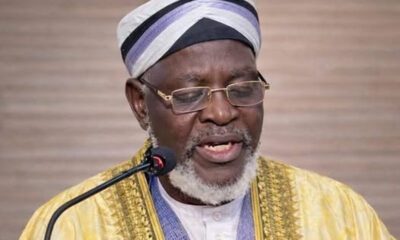
 metro3 days ago
metro3 days agoCourt Orders DIA to Produce Cleric Accused of Coup Plot by February 18
-

 metro1 day ago
metro1 day agoUS Military Boosts Support for Nigeria’s Fight Against Insurgency With Ammunition, Troop
-

 metro24 hours ago
metro24 hours agoArgungu Festival 2026 Highlights Peace, Stability, Economic Growth — Tinubu







